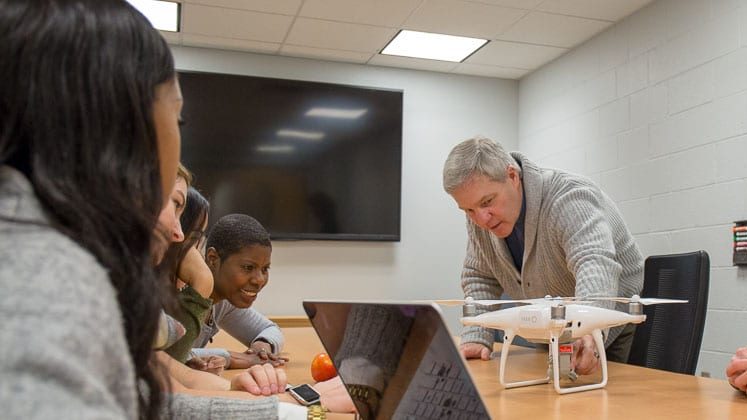
HEALTH BEHAVIOR SCIENCE AND PROMOTION PHD

About the program
The Doctor of Philosophy (PhD) in Health Behavior Science and Promotion provides the training and experience necessary for graduates to become independent researchers and practitioners in health promotion settings, including academia, non-governmental organizations (business and non-profit), allied health fields, and public service at all levels of national government. Students will gain the skills and expertise needed to use theoretical and empirical methods to address the health problems of diverse populations. In particular, students are provided training in research methods, program design and evaluation. Emphasis is placed on examining current research that uses multilevel, ecological models of health and health behavior that address health knowledge, attitudes and beliefs, and social, psychological, environmental and cultural factors in chronic disease etiology and risk reduction.
Applications for Fall admission to the HBSP PhD Program will be reviewed on a rolling basis between January 15 and March 15 for admission to the program in the fall semester. Applicants are expected to submit:
- Application form
- A graduate application essay
- Current curriculum vitae or resume
- A minimum of three letters of recommendation (it is recommended that at least two be from academic references)
- Official undergraduate and graduate transcripts
- GRE scores and TOEFL/IELTS, if applicable
Prior to submitting an application, applicants are strongly recommended to communicate with program faculty (listed below), with whom they have shared research interests and are willing to serve as the applicant's PhD faculty mentor. Applicants should identify up to two HBSP PhD program faculty members who they would like to work with and who have agreed to work with the applicant during their doctoral training in the applicant's graduate application essay.
- A master’s degree in a related field from an accredited college or university with a GPA > 3.3
- GRE scores within the past 5 years
- TOEFL (Test of English as a Foreign Language) score of at least 600 (paper based), TOEFL iBT of at least 100 or IELTS (International English Language Testing System) overall band score of 7.0 for non-native English speakers.
- Applicants must submit all materials directly to the University of Delaware Graduate College using the online admission process before admission can be considered.
- Admission decisions will be made by the Health Behavior Science and Promotion (HBS) PhD Program Committee. Students will be admitted to the program based on enrollment availability, the availability of faculty mentorship, and their ability to meet the following minimum recommended entrance requirements
- Bioinformatics, latent variable modeling, healthy aging, health disparities (Adam Davey, PhD)
- Health literacy, program evaluation, use of wearable technology to promote physical activity and other behaviors to improve cardiovascular health (Gregory Dominick, PhD)
- Policy and environmental change, nutrition and physical activity promotion in early care and education settings (Laura Lessard, PhD, MPH)
- Inclusion, active community living, and cardiometabolic risk factors of individuals with disabilities (Iva Obrusnikova, PhD)
- Psychosocial determinants of physical activity, aging and health, community based participatory research with eating and physical activity behaviors (Elizabeth Orsega-Smith, PhD)
- Smoking cessation, sleep health, sedentary behavior, cardiovascular health, multiple health behavior change, 24-hour epidemiology, and population health (Freda Patterson, PhD, MS)
- Social marketing and health communication, workplace stress, behavior change strategies (P. Michael Peterson, EdD)
- Developing/tailoring community and technology-based interventions to promote healthier lifestyles, especially with underserved populations, diabetes self-management/diabetes prevention, behavior change theory (Laurie Ruggiero, PhD)
- Community-engaged research, built-environment/physical activity promotion, community-level physical activity infrastructure, physical activity measurement (Richard Suminski, PhD, MPH)
- Physical activity measurement and promotion in people with disabilities, mobile health and wearable technologies, gamification for behavior change (DH Lee, PhD)
A limited number of assistantships are available on a year-to-year competitive basis to full-time students (registered in at least 6 graduate credits each semester) based on admission ranking, needs of the program, experience, and expertise of the applicant. Students on assistantships are obligated to engage in assignments for a minimum of 20 hours per week on-site during the fall, winter session, and spring semesters.
The HBSP PhD program requires a minimum of 48 credits that are designed to be completed over a 4-year period. Courses must be at the 600-level or higher to count toward the minimum requirements for program completion.
Year 1
Fall |
Spring |
| HBNS803: Advanced Health Promotion Programming (3) | Core Elective (3) |
| Statistics Elective (3) | HBNS856: Multivariable Statistics for Population Health (3) |
| HBNS855: Qualitative and Mixed Methods Research in Health Sciences (3) | Statistics Elective (3) |
| HBNS868: Independent Research (1) | HBNS868: Independent Research (1) |
| HBNS860: Seminar (0) |
Year 2
| Fall | Spring |
| Core Elective (6) | HBNS820: Social and Environmental Determinants of Health (3) |
| HLPR830: Behavioral Change Strategies (3) | HBNS813: Health Psychology and Behavioral Medicine (3) |
| Statistics Elective (3) | HBNS868: Independent Research (3) |
| HBNS868: Independent Research (1) | |
| HBNS860: Seminar (0) |
Year 3
| Fall | Spring |
| HBNS969: Dissertation Research (9) | Sustaining Dissertation Research |
| HBNS860: Seminar (0) |
Year 4
| Fall | Spring |
| Sustaining Dissertation Research | Sustaining Dissertation Research |
| HBNS860: Seminar (0) |
